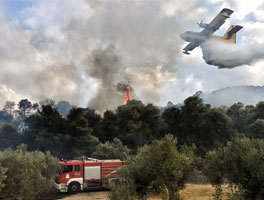 |
Dear readers,
Welcome to the Climate Weekly newsletter by the Centre for Science and Environment’s Climate Change programme and Down to Earth.
As the G20 Summit approaches in September, ministers of the 20 countries met to discuss various key issues like climate change and the energy transition. But they produced outcome documents that offer little hope or clarity on how these countries plan to tackle the crises, as Trishant Dev of CSE’s Climate Change programme writes.
The ministers could not agree to set a new global target for renewable energy installation, a recommendation that experts have made, and that CSE supports. Fossil fuels like oil, natural gas and coal - which are the leading cause of climate change – were scarcely mentioned in the documents. Moreover, an additional set of blockers on climate ambition have emerged, beyond the US and the traditional historical polluters: petro-states and large industrial powers like China, Saudi Arabia and Russia.
Meanwhile, the evidence is clear that we have little time left to decisively reduce emissions and stall the runaway train of global warming. Extreme weather events are already breaking records. This is the year that the Intergovernmental Panel on Climate Change Sixth Assessment Cycle has concluded, and there is ample and clear direction on what actions must be taken. So, while the G20 has been known to have very divergent interests, the lack of a coherent and ambitious vision from the world’s most decisive economies produces weak and confusing signals for what COP28 should achieve in Dubai this year.
Elsewhere, despite above normal rainfall in several parts of India, at least 25.1 per cent of the country is facing drought-like conditions. In fact, after heavy rain and flooding in July, the next two months may be drier than normal for most of the country, according to the IMD’s latest forecast.
|
|
 |
| |
 |
|
| |
 |
 |
| |
By - Avantika Goswami
Climate Change, CSE
|
| |
|
 |
|
|
| |
 |
|
| |
| EXTREME WEATHER TRACKER |
| |
Greece wildfires: how climate change is involved, and what we can do about it, 30 July 2023
|
 |
 |
|
|
| |
 |
|
| |
 |
 |
Extreme heat could claim lives of 204,000 women annually in India, Nigeria & US: Report, 28 July 2023
|
|
|
| |
|
|
| |
|
|
| |
 |
|
| |
 |
|
| |
|
|
| |
|
|
| |
|
|
| |
 |
|
| |
|
|
| |
 |
|
| |
CLIMATE NEWS | SCIENCE| IMPACTS| POLITICS |
|
| |
 |
|
| |
|
|
| |
 |
|
| |
|
|
| |
 |
|
| |
|
|
| |
 |
|
| |
|
|
| |
 |
|
| |
|
|
| |
 |
|
| |
|
|
| |
 |
|
| |
|
|
| |
 |
|
| |
|
|
| |
 |
|
| |
|
|
| |
 |
|
| |
|
|
| |
 |
|
| |
|
|
| |
 |
|
| |
|
|
| |
 |
|
| |
|
|
| |
 |
|
| |
|
|
| |
 |
|
| |
|
|
| |
 |
|
| |
| Video |
|
Cartoon |
| |
|
|
|
|
|
|
| |
|
|
| Onsite Training |
| |
|
|

|
|
|
| |
|
|